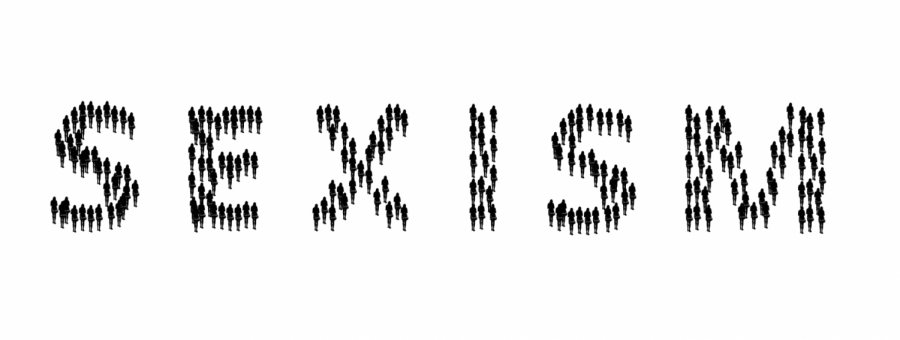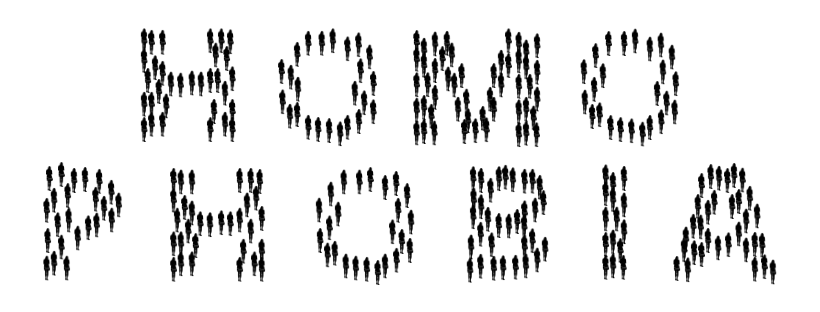Implicit bias
Exploring the internalized discrimination within MVHS
February 25, 2020
The different expectations that different sexes face
Exploring internalized sexism at MVHS
Senior Sayalee Mylvarrapu was sitting in her Java class when her teacher asked a question. Mylvarrapu raised her hand and, after being called on, gave the correct answer. To her surprise, one of the boys sitting close to her whispered under his breath, “Oh my god! She actually knows something!”
This is one of the many experiences that have cultivated Mylvarrapu’s belief in feminism, or the advocacy for women’s rights on the basis of seeking equality for both sexes. Inspired to make a change in her community, she is the president of the Girls Empowerment Project (GEP), a club at MVHS that promotes feminism through raising awareness and hosting activities such as attending the Women’s March.
“[GEP] want[s] to educate the people of MVHS about the true meaning of feminism and equality because a lot of people think feminism is where women have more power than men, but that’s not the case,” Mylvarrapu said. “Feminism is men and women being equal and we want to strive for everyone to learn this true definition.”
Sexism is a global concept, and it is known as the prejudice of a person based on their sex. Though not always, this sex-based discrimination is often targeted towards women. It is seen in the labor industry, according to World Economic Forum, as even today, only six countries in the world give men and women equal legal work rights, such as equal pay, and the U.S. is not one of them.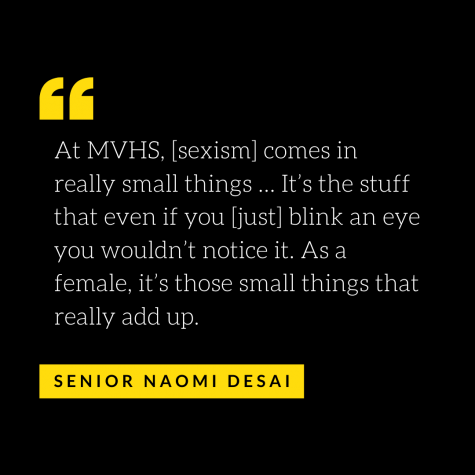
Although Mylvarrapu believes that it is rare to see cases of blatant sexism at MVHS, she feels it is definitely present implicitly. Senior and vice president of GEP Naomi Desai believes that it lurks behind many interactions.
“At MVHS, [sexism] comes in really small things,” Desai said. “In P.E., a lot of the boys never pass to the girls. It’s the stuff that even if you [just] blink an eye you wouldn’t notice it. As a female, it’s those small things that really add up. A lot of people don’t notice it because they think it’s normal and that this is how it is supposed to be.”
A survey taken of 285 students found that 41% consider themselves to be feminist and 44% consider themselves neutral. Another survey of 260 students found that 73% of students have a positive view on feminism or support the movement.
“I think [sexism] is very subtle here and it’s not as outright as it might be in other places,” Mylvarrapu said. “But it is present in the sense that many people don’t think that women should be in the STEM classes, even though there are so many smart women here and even those leading companies. There doesn’t tend to be [as many] women in higher math classes here either. If [a woman] is in a STEM class, they are considered weird and we want to break that stigmatism.”
Mylvarrapu has experienced occasional sexism at home as well, also rather subtly with statements like, “Oh, you know, you shouldn’t do that. You know what, I’ll do it instead, just to ease your load” or “Why don’t you go help your mom?” She responds by refusing those suggestions.
Chinese teacher I-Chu Chang was raised with sexist beliefs but has long since tried to get rid of them in her own life. When Chang’s mother was little, her family did not permit her to continue her education past elementary school, despite being their family’s eldest child and academically strong. As a result of living in a society that enforced these beliefs, Chang’s mother came to believe that perhaps males were more important than females, and treated Chang and her brother differently.
“I think [sexism] is pretty much universal and in [around] 90% of different cultures,” Chang said. “I think it’s changing nowadays, but in the past, women were expected to be housewives, to stay home to take care of kids and not to go out to work and stepping out. Earning bread is husband’s job traditionally.”
Chang remembers a time when sexism was much more blatant and visible at MVHS. She believes that it has changed a lot for the positive over time.
“Almost 20 years ago when I asked the students, do you feel like your family [values] males over females 80% of students raised their hand,” Chang said. “But [these] couple years, only 10% of students will think that [there is sexism in their family], especially probably not from their parents but from the grandparents’ side. But parents nowadays are fair.”
However, Desai thinks that sexist beliefs still exist and are enforced. She also highlights that a sense of “normalcy” surrounds sexism.
“The problem is that people think it is very normal to think of women as less than men and that’s how society follows it, so everyone just gets sucked into this,” Desai said. “It’s hard because when you are little, adults sometimes treat you in a sexist way and you put it off because it’s the adult saying it.”
Because of how much it is reinforced in society, Desai can see how women themselves may believe that they are inferior.
“Even at school, when you’re playing P.E., a sport, the girls probably don’t get the ball that much or something like that and you kind of just assume that that just means like, ‘Oh, I’m just not as athletic as them,’ but it can also be because some people are just sexist and don’t want to give it to the girls,” Desai said. “So [sexism is] everywhere and I think you kind of just blink and forget about it a lot, so some people don’t like to think about, like, ‘Oh, is this because of sexism or is this because I’m just inferior to them?’”
Desai avoids doubting herself because of her gender, which is also something that she tries to teach other girls through GEP. She believes it comes down to her mindset: if someone doesn’t want to see her as an equal, it is their issue to deal with and it should not be something she should worry about.
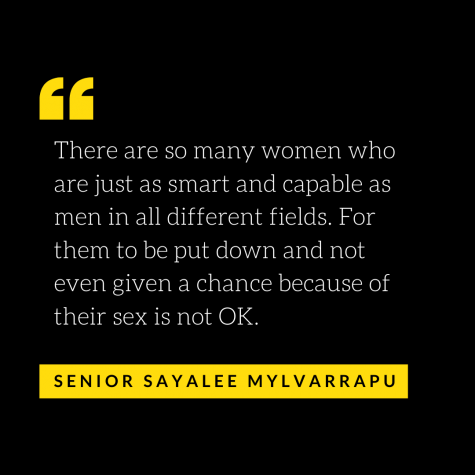
After the 2016 election, Mylvarrapu also started having concerns about this sense of normalcy surrounding sexism on a larger scale, and now regards the equality of women as an even more important matter. She feels bad about the unfairness with which people treat the female sex but accepts that it won’t change in a small time period.
“There are so many women who are just as smart and capable as men in all different fields,” Mylvarrapu said. “For them to be put down and not even given a chance because of their sex is not OK. They might have the ability to do something better or make a change that would not be possible if they were not given the chance. Having those walls that women can only do this and men can only do this does not allow for change to occur.”
Facing internalized homophobia
How MVHS students and teachers deal with internalized homophobia
On the first day of school every year, literature teacher Randy Holaday announces that he is gay to his classes. Although Holaday did not come out as gay until he was 24, years after graduating Archbishop Mitty HS, a Roman Catholic high school, he noticed how his classmates were treated differently and excluded from many social gatherings when they came out as gay.
From not being able to purchase prom tickets in a pair for the same gender to having their entire identity changed and having their sexuality attached to their names, Holaday’s classmates had to face the social taboo of coming out as gay in the conservative high school. The negative stigma around homosexuals at his school forced Holaday to subconsciously ignore the idea of coming out.
According to the Rainbow Project, “Internalized homophobia and oppression happens to gay, lesbian and bisexual people, and even heterosexuals, who have learned and been taught that heterosexuality is the norm and ‘correct way to be.’” Holaday believes that one of the dynamics of internalized homophobia stems from the need to fit in.
“If you are gay, then that auto[matically] separates you from the main group,” Holaday said. “And so, wanting to fit in, I think, is a lot about [social gatherings] too. Anything that might ostracize you. I think, at least when I was in high school, I just suppressed it because I wanted to fit in. So I think homophobia comes from that dynamic.”
Senior Harshita Saha experiences this similar taboo from her family. Being raised in a traditional Indian household, Saha finds it hard to come out as bisexual to her parents, and while her friends and the people at school know, her parents continue to be left in the dark. Saha has spoken to her father about the topic before and knows he would not be supportive if he found out Saha was bisexual.
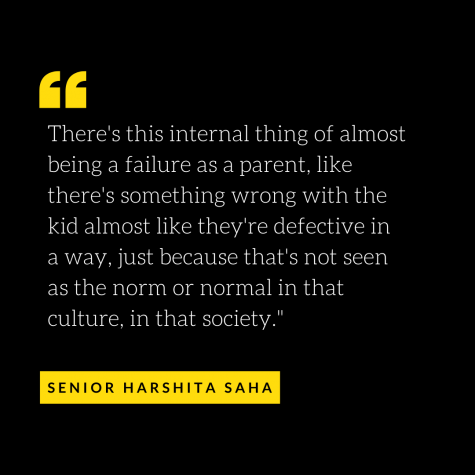
“He’s like, ‘if someone else’s kid is gay, that’s fine as long as it’s not my child,’” Saha said. “There’s this internal thing of almost being a failure as a parent, like there’s something wrong with the kid, almost like they’re defective in a way, just because that’s not seen as the norm or normal in that culture, in that society.”
Sophomore Issa Baca, a bisexual transgender male, has had to face a more intense version of the experience Holaday had felt, as he grew up in a Catholic family that taught him from a young age that being anything but heterosexual or having a gender identity different from one’s biological sex was not okay. With a side of his family completely against his view, Baca had a hard time finding support from people.
“I grew up in a Catholic family who hated who I am now, pretty much to the point where I was told, if I were to be [a member of the LGBTQ+ community], not only would they disown me, they would try to kill me,” Baca said. “As far as that, I didn’t grow up thinking that any of this was OK.”
Getting no respect from others and having hateful comments directed towards him, Baca has had to deal with this hurtful aspect of internalized homophobia, the feeling of always being judged wherever he goes and having to deal with other people’s homophobia and disapproval. However, Baca has learned to put up with this internalized homophobia by receiving therapy and changing his attitude.
“I’ve gotten death threats and a lot of other things that are pretty nasty,” Baca said. “But now I take it with a grain of salt. I don’t really believe it. But before for sure, I just felt like I was doing something wrong and it was an insecurity that I had. With any move, I felt like I was being watched in a negative light. And sometimes I still do that when I go into a new environment, I feel like everybody’s looking at me and thinking, ‘Oh, is that a he or she?’”
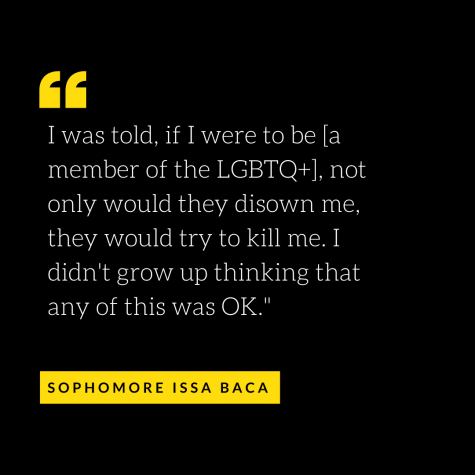
However, Baca feels that even though therapy is a way for him to deal with internalized homophobia, it isn’t as helpful as he imagined. While his therapists were helpful people he could confide in and relate to, he believes that they couldn’t exactly emphasize with his pain and the situations that he was put in.
“I know for a fact when I talk to a therapist or something, I know they’re not going to understand,” Baca said. “ Especially being trans, because it’s less than 1% of the population. But when you talk about it, you realize that most people’s problems have some type of insecurity, and insecurities are internalized homophobia. So if you find other people who have similar problems and issues, you realize you’re not so different from each other.”
While Baca received hateful comments from people not in the LGBTQ+ community, Saha says she has experienced internalized homophobia from people within the community as well.
“Sometimes the people you least expect to be prejudiced are prejudiced,” Saha said. “So even in the gay community, especially towards bisexuality, there’s a lot of stigma because I’ve heard comments like, ‘Oh, you can’t make up your mind, you’re just trying to fit in and be cool as a girl because bisexuality in females is kind of like a fetish.’ Even in a relationship, people assume that you’re going to cheat just because you have more options, but just because you’re straight doesn’t mean you’re attracted to every single person of the opposite sex.”
Baca and Saha have had to deal with all these problems at school, and Holaday recognizes that these instances of bullying do occur; however, he has a hard time figuring out the best way for him to tackle this issue.
“I guess my reaction is just making sure that at least here, it is a safe space,” Holaday said. “I know that’s becoming more and more cliche, but making sure they can come here and one, when something happens they have me to talk to and I can tell them that’s not OK, and two, making sure that within my classroom, the class they’re in and other classes too that students are comfortable and don’t feel that pressure from homophobia.”
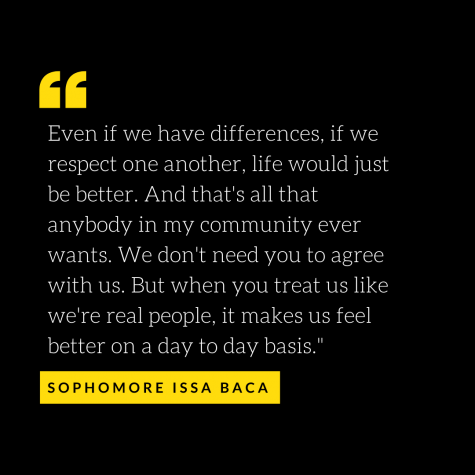
Through it all, Baca believes that if people just started treating others respect and as actual human beings, the problems of internalized homophobia would go away. He believes that the issue stems from people forgetting that all humans are still people, regardless of their gender or sexuality.
“I might think that people who don’t believe in me are stupid,” Baca said. “I still respect them, I’m not going to treat them like not a human being, even though we are different, and I think that’s the problem nowadays. Even if we have differences, if we respect one another, life would just be better. And that’s all that anybody in my community ever wants. We don’t need you to agree with us. But when you treat us like we’re real people, it makes us feel better on a day to day basis.”
Implicit bias in sexuality
Three individuals take the Harvard’s test on implicit bias regarding sexuality to range the student’s preference

